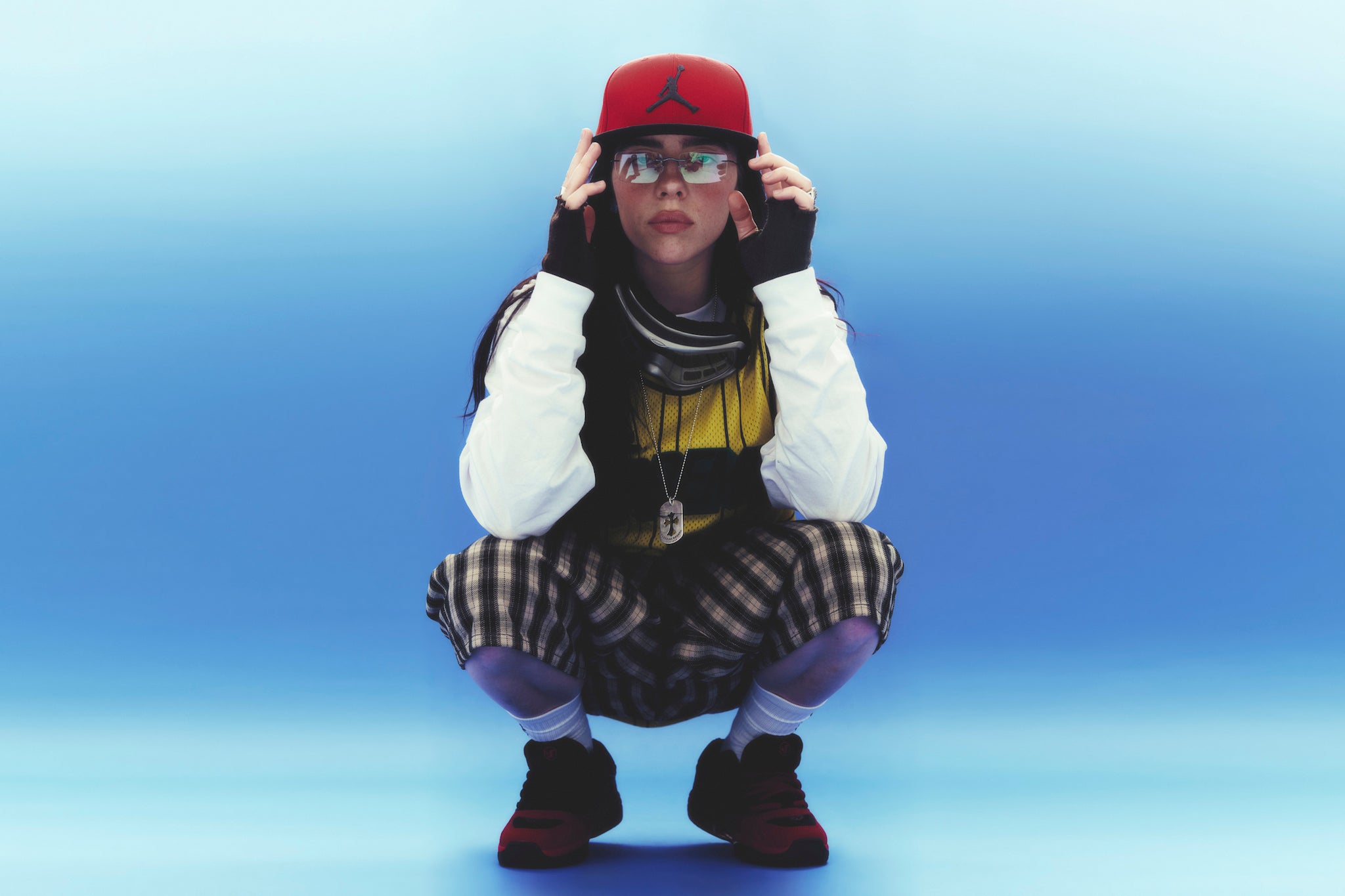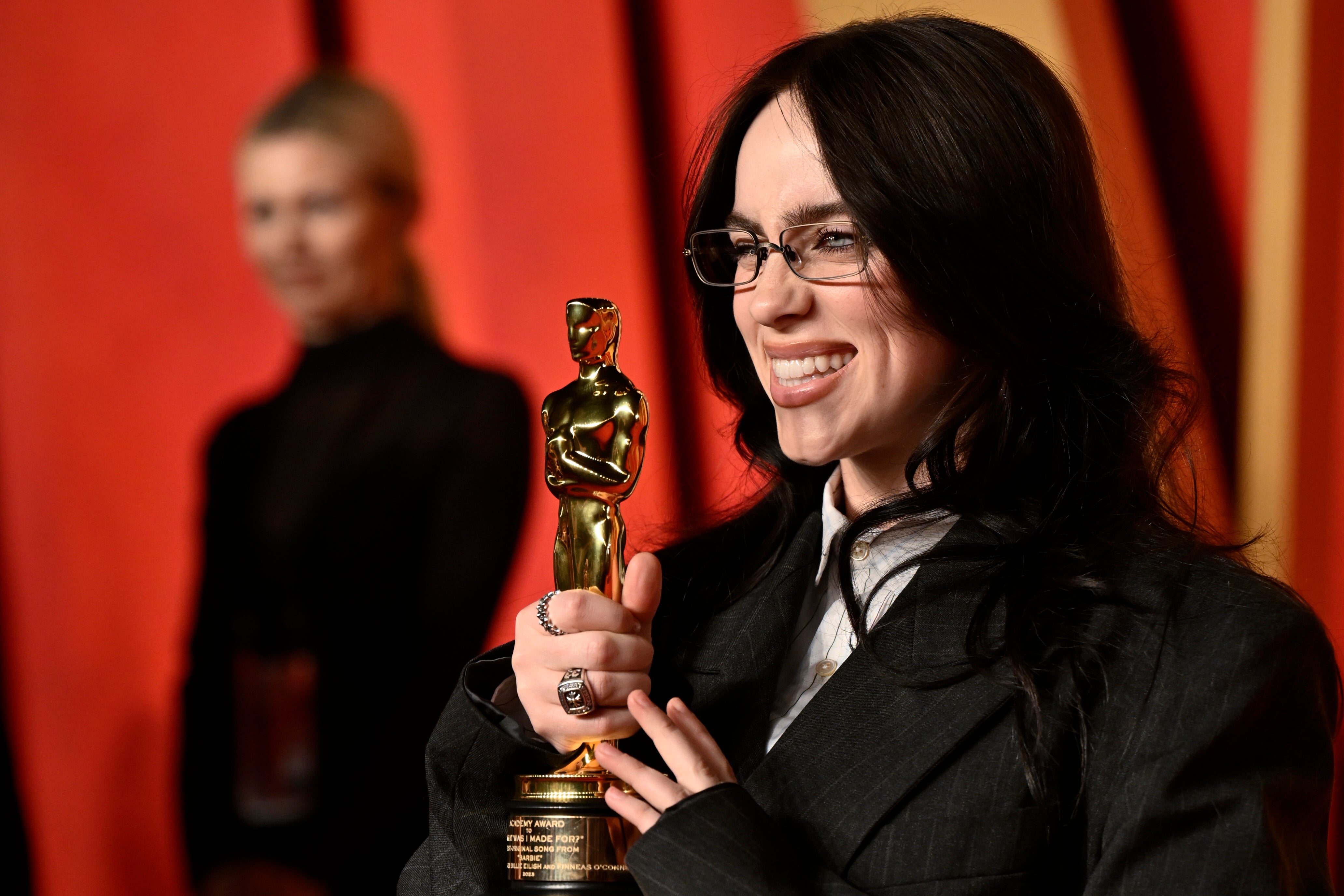
At 22 years old, Billie Eilish is more accomplished than most artists twice her age: a nine-time Grammy winner and two-time Oscar winner, she’s also the youngest artist to ever headline both Coachella and Glastonbury. Her songs have generated over 76 billion combined streams with more than 64 million monthly listeners on Spotify. Truly, the stats are mind-boggling.
Eilish’s lime green hair – now back to black after a brief foray into blonde – has achieved cult status for a certain generation. Amid her stratospheric rise, Eilish has become a patron saint for girls going through it. Across two, now three, albums, she is completely herself: casually and nonchalantly. Whispering confessions of existential dread and bone-deep insecurity in your ear, she’s the adolescent confidant you never had.
Her new album, Hit Me Hard and Soft, which is out today, has been almost universally praised in the press;The Independent waxed lyrical about its “shifting mix of sleepy guitars, sighing cellos, and trancey beats”. But regardless of how the album was going to be received by critics, there’s no doubt it was always going to hit a million young girls right in the feels.
Like previous generations of female singer-songwriters who scrambled the sacred and the profane, from Madonna to Kate Bush to Alanis Morrissette, Eilish lives and dies on the thin line between the whimsical and the terrifying. Her songwriting envelops the whole gamut of emotion – because existing as a woman today is a shifting experience: slapstick comedy in one moment, body horror in the next, and a post-apocalyptic fairytale all at the same time.
Like many Gen Z artists, Eilish’s career sparked with a moment of internet virality. In 2015, at the age of 14, she uploaded “Ocean Eyes” to SoundCloud. The song – a mesmeric, glassy track on which she takes stock of “burning cities and napalm skies” over tearful synths – was written with her brother and collaborator Finneas for a dance class. It took off overnight. It was another two years before Eilish released her first EP, a time during which she was quite literally growing up, home-schooled by her parents in their two-bedroom bungalow in Los Angeles. (She only just recently moved out.) Yet, even on that first outing, released from a perspective of relative obscurity, Eilish was already screaming in all caps for you to leave her alone.
“Party Favour” played a subtle trick of the ear: a melody that began life as a voicemail slowly transforms into a full-fledged break-up song. On it, like so many bedroom pop girls before her who flung their voices into the endless abyss of YouTube via webcam, Eilish strums a cutesy ukulele. In her case, though, the instrument’s innate innocence only makes her lyrical taunt more threatening. With tracks like “Idontwannabeyouanymore” and “hostage”, that EP also cemented one of Eilish’s defining characteristics as a musician: a barely-there whisper that holds you close.
The first noise on When We All Fall Asleep, Where Do We Go?, her 2019 debut album and pop breakthrough, was more intimate still. Gummy and wet, it’s the sound of Eilish taking her Invisalign out, readying herself for recording – a slurpy moment of familiarity not unlike a rapper sparking a blunt in the studio or asking for the headphones to be turned up. Crucially, it’s a sound that makes us aware of her body, just like the “bloody nose” that she sings of on the heavy-lidded pop-trap hit “Bad Guy”. It’s visceral – just like everything else about her.
That album was reviewed favourably and sold 3.9 million units. Critics latched onto its gothic aesthetics and the ASMR-like breathiness of her vocals, but what is most interesting about a song like “Bad Guy” is the actual distortion, which makes Eilish sound like the big bad wolf and Red Riding Hood at the same time. Anytime she softly sighs, drawing you in, the voice you believe to be so gentle shapeshifts into a growl: her baby teeth sharpening into fangs. Over the wobbly dubstep beat of “You Should See Me in a Crown”, Eilish eschews the Disney princess role and makes us bow down before her “one by one/ one by one”. She’s not Snow White; she’s Maleficent. “Come over baby/ I think you’re pretty,” she sings. “I’m okay/ I’m not your baby.”
The compressed rattle of “Xanny” rightfully drew comparisons to the lo-fi agony of SoundCloud rappers like the late XXXTentacion, but its power once again hinges on Eilish’s innate vulnerability: the ironic juxtaposition of aggressive trap with the delicate fragility of her vocals. Every inch of the album was both an intimate confessional and a public oversharing; her voice is classically trained and objectively beautiful, but the barbed thorns of Autotune and tremolo keep outsiders at a safe distance.

As years have passed and Eilish’s star has risen exponentially, that distance has been vital albeit violated. To recount what some people, mostly men but some women, too, have said about Eilish as she climbed her way to the top of the world would only validate it. In fact, all that matters about their commentary is her response to it, which arrived in the form of 2021’s Happier Than Ever – a jazzy if depressing expression of disillusionment with the industry, on which she sifts through the debris of her success.
On opener “Getting Older”, she opines that the “things that I once enjoyed/ Just keep me employed now”. Moments like this call to mind Morrissette who, like Eilish, signed with a label when she was a young girl. (Morrisette was 14; Eilish, 15). Like Morrisette, Eilish has had to learn to make art in front of the world’s peanut gallery, navigating exploitative bigwigs and the rabid fan culture that surrounds her. Last year, she obtained a restraining order against an alleged stalker who broke into her home and sent her and her family hundreds of threatening messages. It wasn’t the first time.
Eilish is just one of too many female musicians for whom a public platform has brought as much danger as it has reward
Veering away from the prickliness of her debut, Eilish’s voice was informed more by reluctance and hesitation on that second outing, as she cautiously got to know herself in the public eye. Midway through the album came “Not My Responsibility”, a woozy spoken-word interlude about the body shaming she faces daily. “If I wear what is comfortable/ I am not a woman/ If I shed the layers/ I’m a slut,” she mumbles. “Is my value based only on your perception?” In concert, these words were accompanied by a four-minute clip of Eilish stripping away her clothes and submerging herself into a shadowy pool of black goop. There is admittedly a tragic irony to the fact Eilish took home her second Oscar for “What Was I Made For?” – the existential dirge from Greta Gerwig’s Barbie soundtrack. This is a woman whose image has been dissected to within an inch of its life and held up to impossible standards set by the very same doll she sings for in the film.

At any opportunity, though, Eilish takes the power back for herself – however she can. Where Megan Thee Stallion’s 2022 hit song “NDA” is about the men who bought her silence, Eilish’s “NDA” flipped the script on a “pretty boy” she won’t let stay the night. “Didn’t change my number, made him shut his mouth,” she purrs. Delicious shades of Fiona Apple can be heard here – how gleefully she breaks with gender roles.
Eilish is just one of too many female musicians for whom a public platform has brought as much danger as it has reward. From stalkers to shady producers, she has all the reason in the world to scream; you could hardly blame her if she did. But it’s all the more powerful that she doesn’t. More often than not, her voice is quiet – her lyrics a scary story whispered into the ear of a friend.
‘Hit Me Hard and Soft’ is out now via Darkroom/Interscope Records







